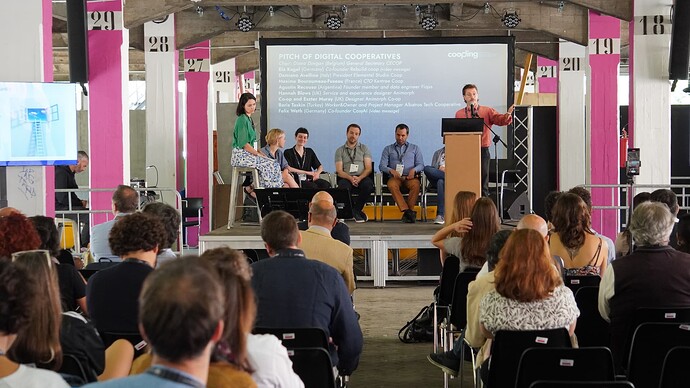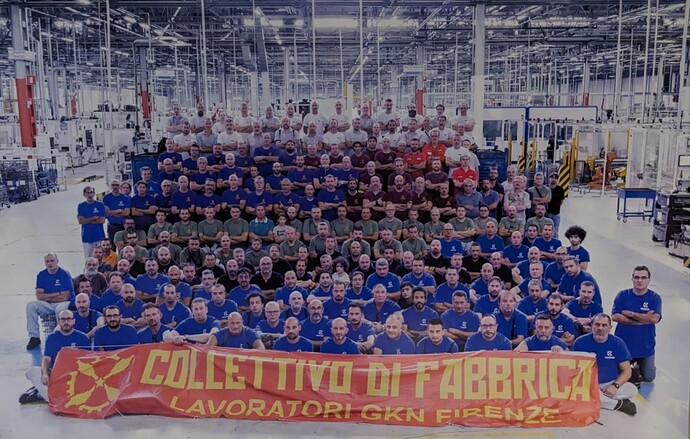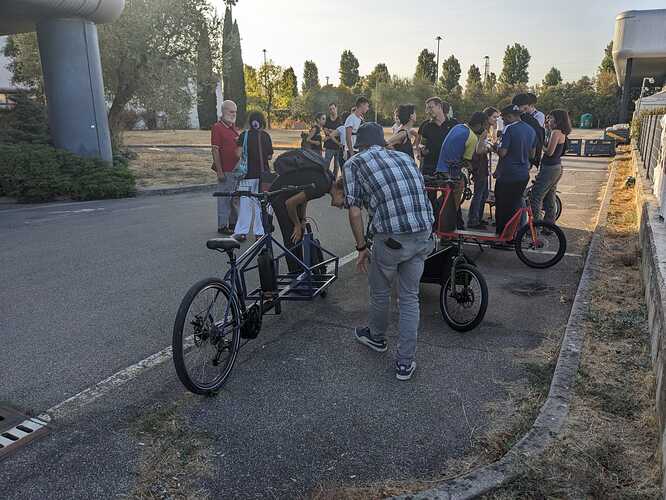In September we co-delegated Hannah Blows and Eszter Muray from Animorph, Sean Farmelo from Birmingham Bike Foundry and me, to participate at the COODING worker-social tech conference. Sean went on to Florence to participate in a series of meetings at Collettivo di Fabricca GKN.
We were able to go with a travel bursary thanks to the Worker Co-op Solidarity Fund.
COODING was a conventional format one day event at the DumBo centre, with presentations and Q&As, including by Vica Rogers from Co-ops UK on platform co-ops and Hannah and Eszter on Animorph’s work and how they embed worker standards in their project and co-op evaluation. It was followed by a more worker co-opy half day of networking and workshops with people from tech worker co-ops in the UK, Argentina, Sweden, Turkey, Italy, France and Bulgaria, aimed at building towards a stronger and more mutually beneficial role in this field for the global worker co-op federation CICOPA.
For background on the groundbreaking worker occupation and conversion plan at GKN, have a read of this.
Here are Hannah and Ezster’s notes from COODING and the CICOPA workshop:
- It can feel like there’s ‘no time’ to look up from the activities. Our co-op is working on to see the wider movements we are a part of. Excellent to make the time to tune in and connect. Reinvigorated to make more time to engage with others in our network of cooperators, CoTech in the UK, and beyond.
- Always inspiring to hear how well FACTTIC organise themselves in Argentina, and how Patio is a thriving international community of co-ops. Interesting to hear more from others how co-ops develop in countries with legal regulations around how co-ops should be structured (like France and Argentina) and ones without. Benefits of some things being decided for you.
- Enriching to meet some of the people behind projects we’ve heard about or seen online, and to be introduced to new ones we hadn’t heard of.
- Decision to be made about whether a co-op can/should grow in membership beyond a certain point, or whether to split into further companies. To take advantage of economies of scale and shared resources, or let 1,000 co-ops bloom. Or both!
- Several co-ops present expressed desire to service other co-ops rather than their current non-co-op clients, due to mismatched values, but that finances prevented this; with. Animorph has cut a path where we can work with clients who share our mission of enhancing human potential, and our co-operative structure is just one facet of this, supporting our approach to business and working together. Interesting to see how different co-ops position themselves both within co-operative movement and general business environments, and to what extend being a co-op is a selling point or not.
- Huge gratitude to all those who had the vision for this event, and for their energy to see it through to completion. It was a pleasure to meet so many new folk sharing the same wavelengths from afar, and a joy to spend time with some old friends again.
And Sean’s report from GKN (written with a view to publishing as a blog on workers.coop):
"Sean Farmelo, a member of Birmingham Bike Foundry attended the Occupied GKN factory in Florence for the event ‘Working Class Bike Days’, which served as the launch of the workers prototype cargo bikes. He was joined from the Cooding conference in Bologna by a member of Digidem Lab Coop in Sweden who work developing the software Decidim, a large scale participatory democracy platform used in Barcelona. The factory itself is absolutely staggering in it’s scale and potential, with a 80,000 sqm site and 40,000 sqm of factory floor filled with high end robots. The owners Melrose, an asset stripping outfit who purchased the company after it was closed down by GKN driveline are asking the workers for around £23m. Since the occupation began in 2021 the machines have been maintained but the site has been kept on ice for legal reasons. So far prototyping has been done in a supportive local fablab, and the focus has been on projects that promote the ecological transition. Workers wanted to move away from producing automotive parts for the like of Ferrari, Audi and Land Rover towards socially useful products. As part of this they have been talking about how to engage the locality and community in the factory – plugging into the community in what Dario, one of their spokespeople calls the ‘socially integrated factory’, a process they are well aware is something quite novel. It’s untrodden ground, perhaps only with paralells to projects like the Lucas Plan in the U.K. Even though the figures involved and the scale of the project seems overwhelming sometimes there is a huge level of support for the project from social movements. The production of cargo bikes is one of a few ecological projects the workers are planning, the main one being the production of photovoltaic solar panels.
I arrived at the factory at the tail end of protests against the expansion of the airport, which is very close to the GKN site, and threatens to overwhelm the valley region of Firenze with even more particulates, propelling the number of tourists in the city even higher and continuing to destabilise the housing market. The workers are completely linked with social struggles in the city, working with councillors and also supporting an intense four month strike at a nearby furniture depot which has a constant picket with tents outside. After the protests there was a large collective dinner, in the workers canteen cooked by supporters and workers. This was followed by a theatre performance in the cathedral like storeroom adjacent to the factory floor, attended by around 3-400 community members. The next day saw technical workshops about the cargo bike plan, discussions about transforming mobility and linking with ecological movements in the region. There was also a fair of local ecological producers and merch stall which included Sambuca and Grappa labelled with ‘Insorgiamo’ collectivo di fabrica GKN slogan, which translates as disobedient, and produced by a much smaller occupied factory workers co-operative in Milan called Rimaflow. The cargo bike project was interesting but the product is not ready for large scale production yet. Participants were present from delivery co-operatives and other bike project in Italy, in a sense the gathering helped to strengthen those links. There was some hope amongst these supporters to formalise a supportive relationship with the workers in the GKN factory to help establish what is needed by Coop Cycle couriers, gauge demand and draw on the expertise about design present in the movement already.
The national co-operative federation Legacoop had agreed a form of match funding for GKN if they reach their financial target. So there is an element of collaboration happening between co-operatives and GKN. The workers estimated that they were able to account for about £9m of the necessary capitalisation costs, partly through a contribution from the workers own social security which would become available if the project went ahead. Any additional support from larger worker co-operatives or federation makes this venture, a little bit more possible. There is a loanstock fundraising campaign currently running hoping for €1,000 from 1000, with a small return on the investment – if the project pulls off! One thing to bear in mind is the huge number of barriers placed in front of the workers, from the local and material need to sustain themselves and their families through the strike. The collectivo began as 400 workers two and a half years ago but has stayed solid at 200 for quite a while now. Barriers are also present nationally and internationally with the foreign multinational who owns the business looking to extract as much money as they can and the extreme far right Meloni government also not supporting the project. However what the Collectivo di Fabrica are attempting is exactly the sort of the undertaking which is completely necessary to bring about an ecological transition. Halting the production of fossil fuel infrastructure, not allowing it to be turned into profit, and instead directing it to the needs of the community. This is the bread and butter of any Green New Deal or degrowth programme – and we see the worker co-operative model at the heart of it. To do so though, workers re-education or training is a crucial part of this mix. The GKN workers are used to highly automated and technical production lines working with complicated but specific robots, and changing industries, working out how to market themselves after moving from a previously b2b and siloed sales model, from which they were largely separate. These educational and skills based challenges are ones which governments and even universities aren’t prepared or willing to help develop, but which are crucial for the success of an ecological transition. "


